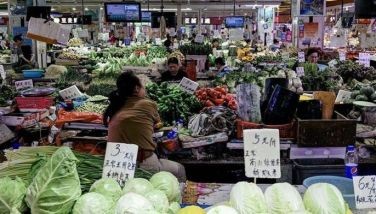Lessons from toilet paper

Crises situations always remind us to go back to the basics. Wash hands. Maintain hygiene. Be careful and be considerate. We are reminded of the age-old lesson like: “How I behave affects you, and how you behave affects others.” Eat right. Take plenty of vitamins. These happenings all over the world are leading to a REBOOT; others call it a RESET towards the basics.
Crises bring out the beauty and the good in people. It also reveals the not-so-pretty-side of them. While certain countries have exhibited an inspiring mass of people burning candles and showing their support for their brave health workers, others continue to hoard masks and hygiene products. You also find in some instances wherein Asians or Asian looking people are beaten up and accused of having brought the virus to their country. These behaviors are so strange and irrational. And for the life of me, the one thing I cannot understand is hoarding up a year’s supply of toilet paper. I have not come across any scientific article or finding that says the virus will lead people to the toilet one too many times. Perhaps this is an excellent time to study how fear and panic can cause people to do irrational things.
A fascinating read can be found in the CNBC website wherein Peter Noel Murray, a New York-based member of the American Psychological Association and the Society for Consumer Psychology, provided his observation on the irrational behavior when panic sets in.1
According to Murray, cognitive and emotional responses were the two key factors involved in influencing our decisions during situations like the coronavirus outbreak.
“In this case, the cognitive factor is cognitive bias, (which means) we tend to overemphasize things that are recent and very vivid,” he explained. “When there’s a plane crash people don’t fly, when there’s a shark attack people think all sharks are killers. That process makes us think that whatever the current thing is, it’s similar to some terrible thing — it catastrophizes our view of whatever this thing is.”
The article continued: “On the emotional side, the answer is self-affirmation. In our minds, we know one day we are going to be dead, and the mind deals with it through (seeking) control,” Murray said.
“There’s an over-representation of fear, and people’s minds need to respond to those kinds of feelings,” he added. “The need for self-affirmation is triggered, and that drives us to do unreasonable things like buying a year’s worth of toilet paper. It overwhelms the knowledge that we don’t need to be doing that.”
Paul Marsden is a consumer psychologist at the University of the Arts London, and he says: “It’s about ‘taking back control’ in a world where you feel out of control.” “More generally, panic buying can be understood as playing to our three fundamental psychological needs.” Those needs were autonomy, or a need for control, relatedness, which Marsden defined as “we shopping” rather than “me shopping,” and competence, which is achieved when making a purchase gives people a sense that they are “smart shoppers.”
Sander van der Linden, an assistant professor of social psychology at Cambridge University said, “When people are stressed their reason is hampered, so they look at what other people are doing. If others are stockpiling, it leads you to engage in the same behavior. People see photos of empty shelves, and regardless of whether it’s rational, it sends a signal to them that it’s the thing to do.”
These are troubled times. And these are the times when we need to show compassion and understanding. Social distancing does not mean social isolation and it certainly does not mean “Every man for himself.” A couple of days ago, long before the “community quarantine” took place in the metros, I put out this post in my digital spaces: “Do not hoard stuff. If you do, you may be depriving our brave and noble health workers of the things they need to do their job to protect all of us.” And Michel de Montaigne says: “A man who fears suffering is already suffering from what he fears.” This is the time when we should learn to be calm, considerate, and to be charitable towards the needs of others.
Why toilet papers? The toilet paper today has suddenly become the “icon” of mass panic. It is also the best time for us to build character. We want to make sure that this crisis brings out the good from us – a legacy we can leave our children and grandchildren for many generations to come.
(Connect with Francis Kong in www.facebook.com/franciskong2. Or listen to “Business Matters” Monday to Friday 8:00 a.m. and 6:30 p.m. over 98.7 DZFE-FM ‘The Master’s Touch’, the classical music station.)
1 https://www.cnbc.com/2020/03/11/heres-why-people-are-panic-buying-and-stockpiling-toilet-paper.html
- Latest
- Trending






























